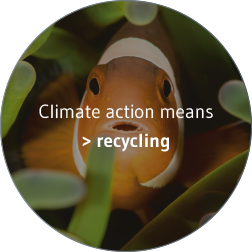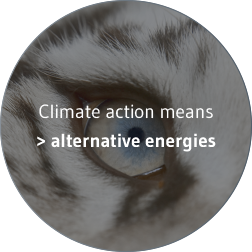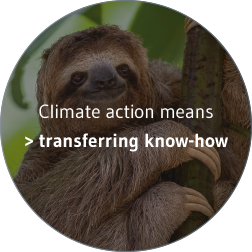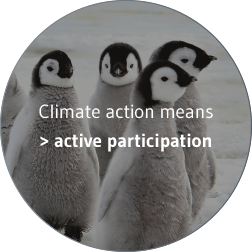Rain is a blessing!
„Water is such a precious resource but it can also cause devastating damage. So much more needs to be done to prevent floods from getting even worse and to ensure our planet remains a place worth living in. The circular economy has great potential here.“
Ann-Christin

Tackling climate change on a global level
The circular economy’s efforts to curb climate change influence activities all around the world. Besides having a knock-on effect (i.e. other nations gradually adopting new technologies), there is a second important aspect here. Being an international company with around 1,000 business locations in over 30 countries, we are in a position to actively drive forward this transfer of technology ourselves and promote a holistic approach to tackling climate change.
Establishing climate-compatible, closed-loop technologies is a far more dynamic process than waiting for the knock-on effect to take hold, as this effect depends on the political direction and other upstream processes in the different countries. These often slow down the development – something we simply cannot afford in our fight against climate change.
Many countries – in Europe as well – are failing to make the most of the opportunities available to them to curb climate change. Recycling rates lie below 20% in some regions. We must and we want to change this situation. We need as much climate action as possible, in as many countries as possible and as quickly as possible.
For this reason alone, it would be irresponsible to focus entirely on the energy transition as being the solution. According to calculations published by the Ellen MacArthur Foundation, switching to renewable energy will only reduce global CO2 emissions by 55%. This is most certainly not enough.
It’s well worth leading the way. For the business world, too
Again and again, people can be heard saying that stricter environmental and recycling standards will put German and European businesses at a disadvantage. In fact, the opposite is true. Using the chemicals and electronic appliance industries as examples, Anu Bradford shows in her book “The Brussels Effect” how the higher standards set by the EU have, in most cases, also become international standards.3
Europe must take on responsibility with its innovative and efficient industry and its leadership role in the area of recycling technology. It is our task to set an example and prove that it is possible to have a good life within the planetary boundaries. Indeed, in view of the fact that the often invoked economic disadvantages for businesses do not actually exist, it is all the more important to meet this responsibility.
The circular economy is doing just this and believes firmly in the knock-on effect of company strategies oriented towards sustainability. Politicians should orient themselves in this direction as well.


A home for hedgehogs and other creatures but also a valuable source of nutrients. Fallen leaves and other types of biomass are ideal for making high quality compost – a compost that’s particularly climate friendly as absolutely no peat has to be used.
Our understanding of a holistic approach: to recycle everything possible
Achieving as much climate action as possible not only needs everyone to join in but also for everyone to do their very best. In our case, this means continuously investing in new recycling technologies in order to recover more and more recyclable materials as well as to separate them even more cleanly from each other. Just one example of this is our state-of-the-art sorting facility in Erftstadt, where plastics can be removed from mixed volumes of waste and separated according to individual material specifications. However, we not only maximise climate action potential by going deeper into specific areas but also by widening the scope of our activities. We make the most of synergies within REMONDIS’ range of operations to unite waste management and production. Transforming waste containing aluminium into a sodium aluminate that can be used as a climate and resource-friendly means to treat wastewater is just one example of many.

Indeed, some of the products we make help to reduce carbon emissions in areas that are not immediately associated with the circular economy. The compost we produce from biomass, for example, reduces the amount of peat used by gardening and agricultural businesses. This, in turn, means less peat has to be removed from the countryside – helping to maintain moors which are such important carbon stores.
Compost made from biomass not only helps reduce CO2 emissions. It also increases the ability of soils to store water fivefold – a valuable property with climate change causing ever more periods of drought.
CO2 in the ground rather than in the air
Not only moors can be used as carbon stores but cultivated land as well, such as fields and woodland. What is needed here is for the soil to have the best possible humus content. This, in turn, can be achieved by targeting the use of special composts such as those produced from biomass (i.e. from organic waste) by REMONDIS' subsidiary RETERRA. A further example of how the circular economy is successfully reducing CO2 levels in the atmosphere and helping to curb climate change.
This may all sound a bit vague to begin with and indeed it would be were it not for the fact that we have developed a special calculation tool for the agricultural sector. Its name: CarboSoil. Its goal: to enable farmers to find out exactly how they can improve the humus content of their soil and so increase its ability to store carbon. Find out more about CarboSoil on REMONDIS' sustainability website

Moors are excellent carbon stores. Yet another reason to conserve them and, preferably, not to remove any peat from them at all. Our composts are helping achieve this as they are made purely from organic waste – no peat whatsoever is added. What’s more, these composts improve the humus content of agricultural land and its ability to store carbon.
The energy transition: a challenge for the recycling sector
The energy transition needs large volumes of raw materials to build wind turbines, solar power plants, electricity storage units etc. If we wish to prevent this high consumption of resources from cannibalising some of the positive impact of the energy switch on our climate, then we have no choice but to systematically recycle the raw materials that are being used.
The energy sector, therefore, urgently needs the circular economy – which is also facing great challenges in this particular area. At present, the recycling rates of strategically important substances such as tantalum, indium and neodymium still lie below one percent.4 This highlights two issues: firstly, there is a huge potential here to help curb climate change. Secondly, it is essential that wind turbines and Co are produced so that the raw materials contained in them can actually be recovered. The key word here is ecodesign.
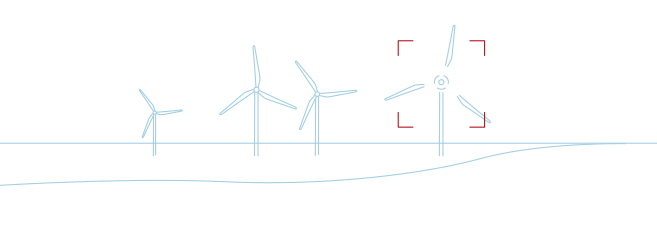
Many parts of a wind turbine are difficult – if not impossible – to recycle

The role of the circular economy in the fight against volatility and exploitation
Further evidence of the holistic approach of our operations is the fact that our recycling solutions support and serve all aspects of sustainability – also, and above all, social and economic sustainability. Recycling raw materials means reducing dependency on imports. Tantalum is a great example of this. Half of the world’s known supplies of tantalum are found in the Democratic Republic of Congo (DRC).5 A concentration of material that – from the point of view of the importing countries Germany and Europe – harbours risks and unpredictable situations. A stop can be put to this volatile state of affairs by ensuring that the volumes of tantalum that have been imported are recovered and reused again and again. There is also another good reason for doing this: it helps tackle the problem of exploitation.

Many countries with large reserves of raw materials – especially in Africa and South America – tend to have precarious working conditions. Safety and social standards are not met and child labour is not uncommon either.
Our goal is to take action ourselves to curb climate change as well as to get others to join in
1 sueddeutsche.de: Rumänien versinkt im Müll – und kauft Abfall aus dem Ausland [Romania is drowning in waste – and is buying in waste from abroad], 22.06.2020
2Ellen MacArthur Foundation: Completing the Picture: How the Circular Economy Tackles Climate Change, p. 14, 2019
3 Bradford: The Brussels Effect – how the European Union rules the world, 2020
4 Faulstich: Circular Economy – Herausforderungen und Perspektiven [Circular Economy – Challenges & Prospects]. In: Nachhaltige Industrie [Sustainable Industry] 2020, pp. 8 & 13, 2020
5 Hagelüken: Business as unusual – Anforderungen an eine Kreislaufwirtschaft von Lithium-Ionen-Batterien [Business as Unusual – Requirements for an Effective Circular Economy for Lithium Ion Batteries], p. 66, 2021






